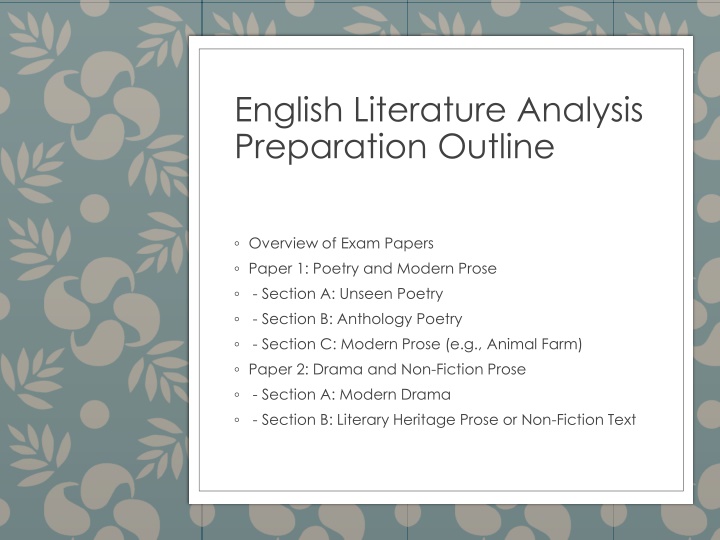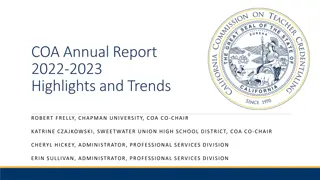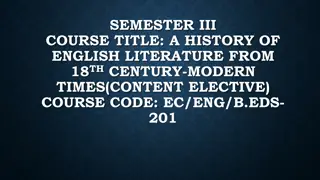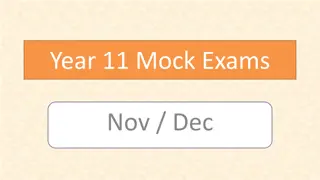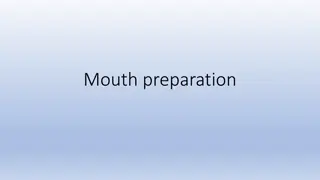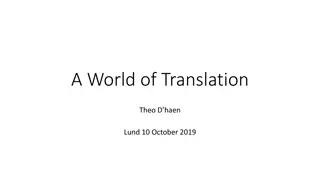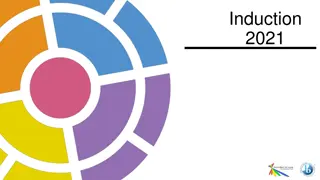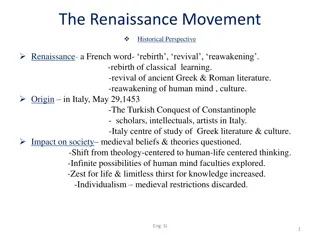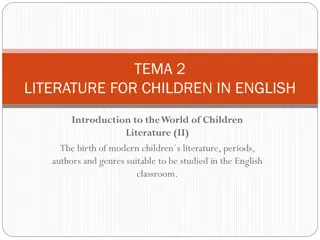English Literature Analysis Preparation Outline
Dive into the essential exam papers for English literature analysis focusing on poetry and modern prose. Covering sections on unseen poetry, anthology poetry, and modern prose, this comprehensive overview provides a structured approach to exam preparation for a deeper understanding of literary works and their analysis.
Download Presentation

Please find below an Image/Link to download the presentation.
The content on the website is provided AS IS for your information and personal use only. It may not be sold, licensed, or shared on other websites without obtaining consent from the author.If you encounter any issues during the download, it is possible that the publisher has removed the file from their server.
You are allowed to download the files provided on this website for personal or commercial use, subject to the condition that they are used lawfully. All files are the property of their respective owners.
The content on the website is provided AS IS for your information and personal use only. It may not be sold, licensed, or shared on other websites without obtaining consent from the author.
E N D
Presentation Transcript
English Literature Analysis Preparation Outline Overview of Exam Papers Paper 1: Poetry and Modern Prose - Section A: Unseen Poetry - Section B: Anthology Poetry - Section C: Modern Prose (e.g., Animal Farm) Paper 2: Drama and Non-Fiction Prose - Section A: Modern Drama - Section B: Literary Heritage Prose or Non-Fiction Text
1. Analysis of Character/Theme Task: Analyze how a specific character or theme is developed through the text. Example: How does George Orwell portray the pigs as a different class of citizen compared to the other animals? Types of Questions 2. Close Reading and Language Analysis Task: Focus on how specific language, imagery, or structure shapes meaning. Example: How does the use of figurative language enhance the theme of corruption in Animal Farm? 3. Contextual Analysis Task: Discuss how the context (historical, political, social) influences the text. Example: Explore how the Russian Revolution is reflected in Animal Farm.
4. Comparison Questions (Paper 1) Task: Compare themes, characters, or language between two texts (usually in poetry). Example: Compare the presentation of power in two poems from the Edexcel anthology. Types of Questions (cont.)
Key Literary and Structural Devices to Know Literary Devices: - Metaphor, Simile, Personification - Symbolism (e.g., the windmill in Animal Farm as a symbol of manipulation) - Allegory (understand how Animal Farm functions as an allegory for the Russian Revolution) - Irony (e.g., Orwell's satirical tone) - Alliteration, Onomatopoeia Structural Devices: - Narrative Perspective (e.g., third-person in Animal Farm) - Foreshadowing - Flashback - Juxtaposition (e.g., the contrast between the pigs and the other animals) - Repetition (e.g., Squealer s repeated justifications)
P: Point - State your point clearly. E: Evidence - Provide a direct quote or example from the text. E: Explanation - Explain how this evidence supports your point. L: Link - Link back to the question or argument. Exam Techniques: PEEL Paragraphs
Sample Question and Answer with Quotes and Techniques Question: How does the author portray the pigs as a different class of citizen to others in Animal Farm? Point: In Animal Farm, Orwell portrays the pigs as a distinct upper class by highlighting their gradual accumulation of privileges. Evidence 1: "Napoleon is always right." Technique: Repetition and Indoctrination The repetition emphasizes blind loyalty. Reader s Impression: The reader feels uneasy as the mantra showcases mental control, reinforcing the pigs' superior class. Evidence 2: "All animals are equal, but some animals are more equal than others." Technique: Paradox Highlights the absurdity of the pigs logic to maintain dominance. Reader s Impression: The reader feels the betrayal of the pigs and twisted logic to oppress others. Evidence 3: "The pigs moved into the farmhouse and began sleeping in beds." Technique: Symbolism The farmhouse symbolizes comfort and privilege previously forbidden. Reader s Impression: The pigs becoming more human establishes their class separation from other animals.
1. Understand the Context: Connect the text to its historical, political, or social background. 2. Use Specific Quotes: Memorize key quotes that are flexible for multiple themes. 3. Practice Timed Responses: Write thoughtful responses within the time limit. 4. Balance Analysis and Evidence: Avoid plot summary, focus on analysis. 5. Plan Before Writing: Spend time planning using PEEL. Tips for Success
